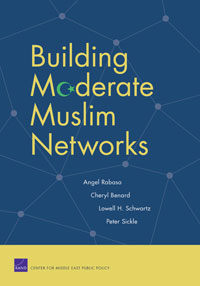BUILDING MODERATE MUSLIMS NETWORKS
By Angel Rabasa, Cheryl Benard, Lowell H. Schwartz, Peter Sickle
RAND Centre for Middle East Public Policy, USA
Pages: 216
2007
ISBN/EAN: 978-0-8330-4122-7
Price: $30.00
Rand‘s Building Moderate Muslims Networks is an outcome of four US scholars putting together a comprehensive plan to neutralise the Islamic threat.
The book exposes how the Americans look to Muslim societies and wish to change their outlook and behaviour, and exposes the hollow slogan of “Bringing democracy, rule of law and social justice” to the Muslim world.
For the US and its allies Radical Islam is the destabilizing force. To counter Islam is possible only by gaining a better understanding of the broad range of views among Muslims and selecting potential allies among them.
By Rand’s description, a key characteristic of radical Muslim fundamentalists is their open and aggressive hostility toward the United States, coupled with a goal of damaging and destroying democratic society. Fundamentalists want to impose and expand the strict observance of Islam through force, violence, terrorism, and any other means necessary. On the other hand the Traditionalists tend to concentrate on keeping their community and families within a pious Islamic framework. They tend not to challenge the state. Modernists and secularists are more closely aligned with the West, and the views of modernists and secularists are increasingly being articulated in the Islamic world.
The suggested action plan is:
a) Support the modernists first.
b) Support the traditionalists against the fundamentalists.
c) Confront and oppose the fundamentalists.
d) Selectively support secularists
e) Discredit extreme fundamentalist beliefs
Moderate Muslim Networks include:
1. Liberal and secular Muslim academics
2. Young moderate Muslim clerics
3. Community activists
4. Women’s groups
5. Journalists, writers and communicators, etc.
Among Rand’s list of “Moderate Muslims” are Nasser Khader, Danish Social Liberal Party MP; Rachid Kachi, French Union for Popular Movement Party MP; Samia Labidi, Tunisia; Afshin Ellian, an Iranian living in Netherlands; Mastafa ef Coric, Sarajevo, Bosnia; Abdullahi An-Naim, Sudan; Mohammad Al-Jassem, Editor of Al-Watan, Kuwait; Ibn Warraq (pseudonym);Asghar Ali Engineer, India; Younus Shaikh, Pakistan. lives in Switzerland; Marcel Khalifa, musician, Lebanon; Abdurrahman Wahid, leader of Muhammadiyah and ex-president of Indonesia; Fethullah Gulen, a sufi shaikh, Turkey; Saad Eddin Ibrahim, Egypt; Naguib Mahfouz, Egypt; Husain Haqqani, origin Pakistan, lives in the USA; Salman Rushdi; Ayan Hirsi Ali; Wafa Sultan, USA; Muhammad Shahrour, modernist Syrian writer; Nasr Abu Zaid, Egypt, lives in Netherlands; Taslima Nasreen, etc.
Some Moderate Muslim Organisations listed in Rand’s book are: Arab Organisation for Human Rights; European Islamic Conference, Paris; Muslim Council of Britain; Progressive British Muslims; Sufi Council of Britain; Nahdat-ul-Ulema, Indonesia; Muhammadiya, Indonesia;Ulema League of Phillipines; Centre for Strategic Studies in Amman; Kuwait National Democratic Movement; Reform Society of Dubai, UAE; Al-Da’wa al-Islamiyya Society, Tripoli, Libya; The Free Muslim Coalition (12 chapters in the U.S.A. and Canada); American-Arab Anti-Discrimination Committee; The Institute of Islamic Studies, India; The Centre for the Study of Society and Secularism, Mumbai, India.
Of special interest are NGOs and affiliates with the Washington DC based Centre for the Study of Islam and Democracy (CSID). These non-profit organizations, funded by the US government are arranging discussions and seminars in Muslim countries and organizing the US tours for ‘soft’ Muslim academics, intellectuals, editors and activists. CSID is frantically developing networks of Muslim democrats, including Islamists who in the CSID view adhere to a democratic agenda. US State Department’s Bureau of Democracy, Human Rights, and Labour (DRL) has been funding many Muslim organisations and groups.
Rand study discourages engaging the so-called Islamists, and laments that the Salafists are gaining ground in many ‘secular’ and socially liberal societies.
The book is a must read for the Islamist groups as well for the policy-makers in the Muslim governments. Greenspan, the Ex US Federal Reserve boss has spilled the beans about the real aim of Iraq war is to control oil. This book exposes the real intent behind the American soft corner for a lot of Muslim activists around the world.


